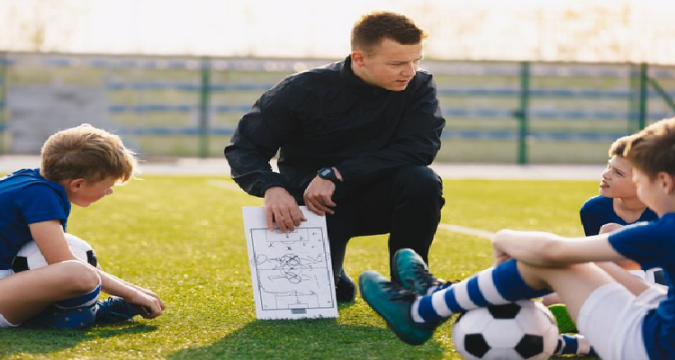
In the world of sports, a coach is often seen as the primary figure responsible for a team’s performance on the field. However, the role of a sports club coach extends far beyond just strategizing plays and improving athletic skills. Coaches are integral to developing athletes both personally and professionally, fostering a positive environment, and ensuring the overall success of the sports club. In this article, we will explore the key responsibilities of a sports club coach that go beyond just the game itself.
1. Skill Development and Training
One of the primary responsibilities of a sports club coach is to develop the skills of their athletes. This involves creating and implementing training programs that enhance individual and team performance. A coach must evaluate each player’s strengths and weaknesses, design drills that target areas for improvement, and provide constructive feedback. This process not only helps athletes refine their technical skills but also builds their confidence and fosters a sense of accomplishment.
Coaches must stay up-to-date with the latest training techniques and sports science to ensure their methods are effective. This may involve attending workshops, obtaining certifications, or collaborating with other coaches. By continuously enhancing their knowledge, coaches can provide their athletes with the best training possible, setting them up for success both on and off the field.
2. Team Building and Cohesion
A successful sports team is not just a collection of talented individuals; it requires strong teamwork and cohesion. Coaches play a vital role in fostering a sense of unity among team members. This involves creating a positive team culture, promoting communication, and encouraging collaboration.
Coaches can facilitate team-building activities that help players develop trust and camaraderie. These activities may include team outings, group discussions, or trust-building exercises. By nurturing strong relationships within the team, coaches can help players work together more effectively during games, leading to improved performance.
Additionally, coaches should be attentive to team dynamics and be prepared to address any conflicts that arise. Conflict resolution skills are essential, as addressing issues quickly can prevent them from escalating and negatively impacting team morale. A coach who can create a harmonious environment will foster a positive atmosphere where athletes feel comfortable and motivated to excel.
3. Mentorship and Personal Development
Beyond the technical aspects of the sport, coaches have a responsibility to mentor their athletes in personal development. This includes teaching important life skills such as discipline, resilience, teamwork, and leadership. Coaches can help athletes set goals, both athletic and personal, and guide them in developing the mindset required to achieve these objectives.
Providing mentorship means being a role model. Coaches should embody the values they wish to instill in their athletes, such as sportsmanship, integrity, and dedication. This mentorship can significantly impact a young athlete’s life, helping them develop into not just better players but also well-rounded individuals.
4. Communication and Feedback
Effective communication is one of the cornerstones of a successful coach. Coaches must be able to convey their strategies, expectations, and feedback clearly and constructively. This involves more than just speaking; it requires active listening and understanding each athlete’s unique perspective.
Regular feedback is crucial for athletes’ growth. Coaches should create a supportive environment where players feel comfortable receiving constructive criticism. By offering specific, actionable feedback, coaches can help athletes identify areas for improvement while also recognizing their successes. This balance is vital for maintaining motivation and fostering a love for the sport.
Moreover, coaches need to communicate with parents, club officials, and other stakeholders. Keeping everyone informed and involved can enhance the club’s overall atmosphere and support the athletes’ development. Strong communication skills ensure that all parties are aligned with the club’s goals and values.
5. Administrative Duties and Planning
While coaching may seem focused on the field, there are significant administrative responsibilities that come with the role. Coaches must manage schedules, organize training sessions, coordinate travel for competitions, and oversee equipment needs. This organizational aspect is crucial for the smooth operation of the sports club.
Planning is also a key responsibility. Coaches should develop season plans that outline training objectives, competition schedules, and performance goals. By having a clear plan, coaches can ensure that their athletes are prepared for the challenges ahead.
6. Promoting a Positive Club Culture
Lastly, coaches play an essential role in shaping the culture of the sports club. They should promote values such as respect, inclusivity, and sportsmanship. A positive club culture encourages participation, builds loyalty, and attracts new members.
Coaches can foster this culture by encouraging open dialogue, celebrating team achievements, and recognizing individual contributions. By instilling a sense of pride in the club, coaches help create an environment where athletes are motivated to work hard and represent their club with honor.
Conclusion
The role of a sports club coach extends far beyond just strategizing for games. From skill development and team building to mentorship and administrative duties, coaches play a crucial role in shaping the athletes they work with. By embracing these responsibilities, coaches not only contribute to the success of their teams but also foster personal growth and a lifelong love for sports among their athletes. Ultimately, effective coaches are those who understand that their influence reaches beyond the game, impacting lives in meaningful and lasting ways.